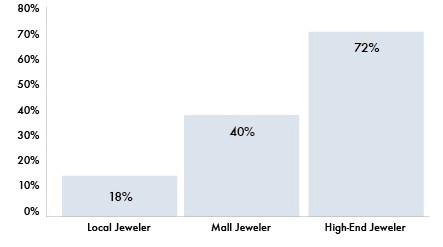SEATTLE, Dec. 9, 2014 (GLOBE NEWSWIRE) -- Diamonds may be a symbol of the heart, but Americans stand to save thousands by using their head. A new study by Wakefield Research shows Americans are overpaying by as much as 72% when they buy a diamond engagement ring from a traditional jewelry store versus finding one of the same quality at a trusted online retailer such as Blue Nile. The study's findings are timely as the holidays are the most popular time of year to get engaged.
Diamonds can be easily compared using the "Four C's" (cut, color, clarity, and carat). In the study, all rings had to meet the following criteria: a Gemological Institute of America (GIA)-certified, round-shaped diamond that shared the same "Four C's" (1 carat, ideal cut, VS2 clarity, H color), with a platinum six prong setting. Prices were collected from a leading luxury jewelry chain, traditional mall-based jewelers, and independent local jewelers in the following cities: Atlanta, Boston, Chicago, Dallas/Fort Worth, Houston, Los Angeles, New York City, Philadelphia, San Francisco, Seattle, and Washington, D.C. The prices were then compared to prices at online jeweler Blue Nile.
A comparison of the average price showed that by going to a brick & mortar store, Americans are overpaying for the same quality ring by 72% at a leading luxury jewelry chain, 40% at traditional mall-based jewelers, and 18% at independent local jewelers, than by going to online jeweler Blue Nile.
"Blue Nile was founded on the principle that there is a smarter way to buy a diamond and paying thousands of dollars less than a traditional jewelry store for the same quality diamond certainly lives up to that standard," said Blue Nile President, CEO, and Chairman Harvey Kanter. "After all, would you pay 72% more for the same car at a different dealer?"
Despite the obvious savings on quality diamonds, surprisingly only 8% of Americans will shop for diamond jewelry online. Instead, 46% go to traditional mall-based jewelers, 32% to independent local jewelers, and 15% to a leading luxury jewelry chain according to the study. The study included opinion data that revealed the reason for the discrepancy may be confusion around the world's most precious stone, including:
- Prices: 38% incorrectly believe traditional mall-based jewelers have the best prices for quality diamonds, with another 28% incorrectly believing independent local jewelers have the best prices.
- Quality: 51% incorrectly believe a leading luxury jewelry chain provides the best quality diamonds, followed by traditional mall-based jewelers (25%), and local independent jewelers (19%).
- Four C's: 85% incorrectly identified the Four C's of diamonds, and by understanding the Four C's, diamonds can be easily compared to find the best price.
"There is a lot of misinformation out there about price and quality in diamonds. Whether or not consumers decide to purchase from Blue Nile, we want them to be educated about the process so they know exactly what they're buying," Kanter said. "There is no romance in overpaying for a diamond."
For more information or to be connected to the researchers, please contact:
Josh Holland
Blue Nile, Inc.
206-336-6773
joshh@bluenile.com
About Blue Nile, Inc.
Blue Nile, Inc. is the original online jeweler. The company offers a smarter way to buy engagement rings, wedding rings, and fine jewelry by providing in-depth educational materials and unique online tools that place consumers in control of the jewelry shopping process. Blue Nile has some of the highest quality standards in the industry and offers thousands of independently certified diamonds and fine jewelry at prices significantly below traditional retail. Blue Nile can be found online at www.bluenile.com. Blue Nile's shares are traded on the Nasdaq Stock Market LLC under the symbol NILE.
Average Price Across Studied Markets
(Source: Wakefield Research)
http://www.globenewswire.com/newsroom/prs/?pkgid=29525
Average Percentage More than Blue Nile
(Source: Wakefield Research)
http://www.globenewswire.com/newsroom/prs/?pkgid=29526
Methodological Notes:
The Blue Nile Diamond Index research was conducted by Wakefield Research (www.wakefieldresearch.com) between September 4th and October 1st, 2014 using telephone and online survey methodologies.
Opinion data was collected among 1,000 nationally representative U.S. adults ages 18+, using an email invitation and an online survey. Quotas have been set to ensure reliable and accurate representation of the U.S. adults. Results of any sample are subject to sampling variation. The magnitude of the variation is measurable and is affected by the number of interviews and the level of the percentages expressing the results. For the interviews conducted in this particular study, the chances are 95 in 100 that a survey result does not vary, plus or minus, by more than 3.1 percentage points from the result that would be obtained if interviews had been conducted with all persons in the universe represented by the sample.
Diamond prices for brick-and-mortar stores were collected from 33 stores via telephone interviews in 11 US cities including: Atlanta, Boston, Chicago, Dallas/Fort Worth, Houston, Los Angeles, New York City, Philadelphia, San Francisco, Seattle and Washington, DC. The high-end and mall jewelry stores were selected by Blue Nile and the local jewelry stores were selected on the basis of online reviews. Prices of Blue Nile diamond rings were found on the website, www.bluenile.com, during the same time period. All diamond rings had to meet the following criteria: a 1 carat, round shape, GIA certified stone that has an ideal cut, VS2 clarity and H color, with a platinum six prong setting. The analysis was conducted using the statistical software R, in order to calculate the mean and ranges for each store. Plots were drawn using the same software.
The photos are also available via AP PhotoExpress.

